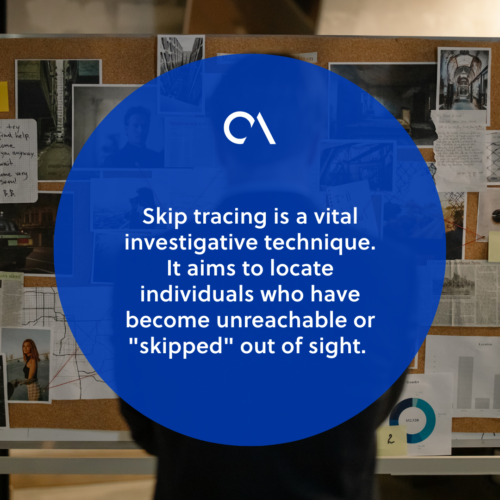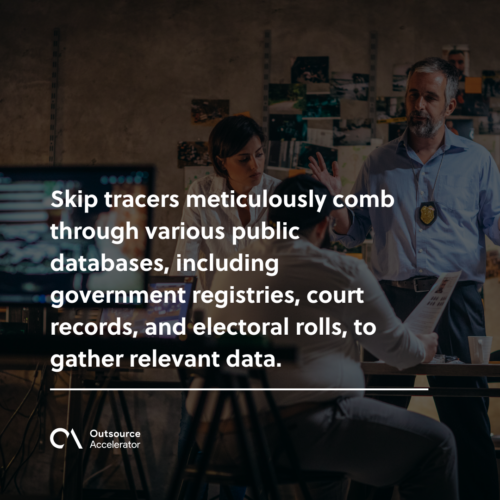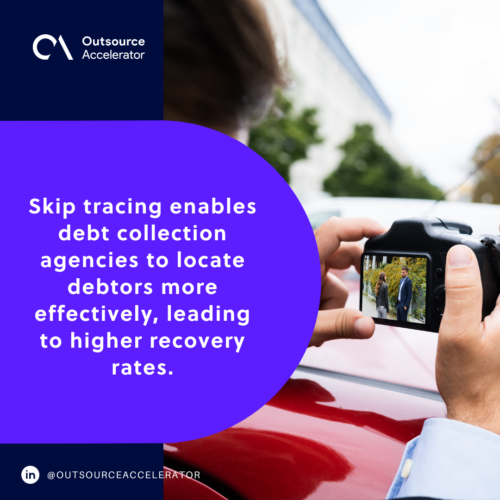Uncovering the art of skip tracing

Skip tracing is a term that has been around for quite some time, but you may not have heard it before.
It’s an effective and systematic way of finding a person of interest. Especially if the individual is trying to avoid legal or financial responsibilities.
Therefore, it can play a crucial role in a wide range of industries. The method assists with debt collection, asset recovery, law enforcement investigations, and even family tracing.
In this post, we will explore skip tracing, how it works, its applications, its pros and cons, and the best approaches for its implementation.
Defining skip tracing
Skip tracing is a vital investigative technique. It aims to locate individuals who have become unreachable or “skipped” out of sight.
These people may have disappeared intentionally or otherwise, avoiding certain responsibilities they need to fulfill. This is why skip tracing is needed and implemented.
The term “skip” refers to the person who has left, and “tracing” refers to the process of finding them. It employs various methods and techniques to gather information and trace the whereabouts of the subject in question.

Skip tracing vs. Batch skip tracing
While skip tracing focuses on finding an individual, batch skip tracing is for finding multiple people. It’s a method that enables the streamlining of locating several individuals simultaneously.
The process uses advanced technology and databases to search for relevant information efficiently. It involves inputting data, such as names, addresses, or phone numbers, into a collection.
Batch skip tracing allows investigators to obtain comprehensive reports that aid in locating the desired individuals quickly and effectively.
Difference between a skip tracer and a bounty hunter
Skip tracers and bounty hunters may seem similar in their pursuit of finding individuals. However, there are distinct differences between the two roles.
Skip tracers are primarily focused on gathering information and tracking down individuals. They do it for purposes like legal investigations or debt collection.
On the other hand, bounty hunters are authorized professionals who locate and apprehend individuals who have skipped bail or failed to appear in court.
The techniques used may overlap and be similar, but the objectives and legal frameworks surrounding these roles differ significantly.
How does skip tracing work?
Skip tracing combines traditional and modern investigative methods to uncover information about a person’s current location.
Skip tracers piece together the puzzle by utilizing various data sources, following leads, and leveraging technology to track down the subject.
It is a meticulous process that requires attention to detail, persistence, and an extensive understanding of available resources.
Skip tracing services methods
Skip tracers use various methods and techniques to gather information and locate individuals. Here are some of the key approaches employed in skip tracing:
Public records searches
One of the foundational methods in skip tracing is searching public records. These records can provide valuable information, such as:
- Addresses
- Phone numbers
- Property ownership
- Marriage and divorce records
Skip tracers meticulously comb through various public databases, including government registries, court records, and electoral rolls, to gather relevant data.

Social media and online searches
In today’s digital age, social media platforms have become treasure troves of personal information. Skip tracers can leverage social media platforms, online forums, and search engines to gather data.
These specialists can uncover valuable clues and potential leads by examining public posts, connections, and activities.
Phone and email searches
Contact information is crucial in skip tracing. Skip tracers carry out phone and email searches to locate individuals.
They use reverse phone lookup services, email tracing tools, and databases to track down active phone numbers and email addresses associated with the subject. These methods can lead to direct communication or further information gathering.
Surveillance and field visits
In certain cases, skip tracers may resort to surveillance and field visits to gather information. This hands-on approach involves visiting locations, interviewing acquaintances, or conducting stakeouts.
Surveillance and field visits provide valuable real-time insights that can aid in locating the person of interest.
Searches using skip tracing software
Skip tracers leverage advanced and technology-designed databases specifically for skip tracing purposes.
These tools collect information from various sources, including public records, social media, and online directories. They allow skip tracers to conduct comprehensive searches, cross-reference data, and uncover hidden connections.
Skip trace applications
Skip tracing finds applications across diverse industries and sectors. Here are some of the key areas where skip tracing plays a vital role:
Debt collection
In the field of debt collection, skip tracing is instrumental in locating individuals who owe outstanding debts.
By employing skip tracing techniques, debt collection agencies can track down debtors and initiate the necessary steps to recover the owed funds.
Skip tracing helps establish contact with debtors, negotiate repayment plans, and facilitate the resolution of financial obligations.
Asset recovery
Skip tracing is also widely used in asset recovery efforts. Skip tracers step in to locate and recover these assets. Especially when there’s an attempt to conceal or transfer assets to avoid their rightful claims.
Legal and law enforcement investigations
Skip tracing plays a crucial role in legal and law enforcement investigations. Law firms, attorneys, and law enforcement agencies utilize the technique to locate witnesses, defendants, or people of interest.
Skip tracers assist in gathering evidence, serving legal documents, and ensuring the smooth progress of legal proceedings.
Missing persons and family tracing
Skip tracing is also employed in cases of missing persons and family tracing efforts. When individuals are missing or separated from their families, skip tracers can assist in locating and reuniting them.
By using investigative methods and databases, skip tracers help bring closure to families and provide a lifeline to those who have lost contact with their loved ones.
Background checks and employment screening
Employers and human resources departments often rely on skip tracing for thorough background checks and employment screenings.
Skip tracing verifies the accuracy of the provided information and conducts comprehensive searches. It helps evaluate the suitability of candidates, ensuring workplace safety and safeguarding organizational interests.
Pros of skip tracing service
Skip tracing offers several advantages across different industries, like:
- Enhanced debt recovery rates – Skip tracing enables debt collection agencies to locate debtors more effectively, leading to higher recovery rates.
- Improved investigative efficiency – In legal and law enforcement investigations, the process expedites the process of locating key individuals and gathering evidence.
- Asset protection and recovery – The method helps safeguard assets and aids in the recovery of hidden or misappropriated resources.
- Reuniting families and finding missing persons – Skip tracing provides hope for families searching for missing loved ones and facilitates the process of reunification.
- Mitigating potential risks – Thorough background checks enabled by the technique minimize risks associated with hiring, partnerships, and other engagements.

Cons of skip tracing service
While skip tracing offers valuable benefits, it is important to consider some of the potential downsides:
- Invasion of privacy concerns – Skip tracing, which involves accessing personal information. This raises privacy concerns if not conducted responsibly and within legal boundaries.
- False or outdated information – Databases and records may contain inaccuracies or outdated information. They may lead to wasted efforts and incorrect conclusions.
- Ethical considerations – The ethical use of skip tracing techniques requires investigators to navigate sensitive situations with professionalism and respect for individuals’ rights.
- Legal limitations – Skip tracers must adhere to applicable laws and regulations to ensure their activities are within legal boundaries and uphold individuals’ rights.







 Independent
Independent




